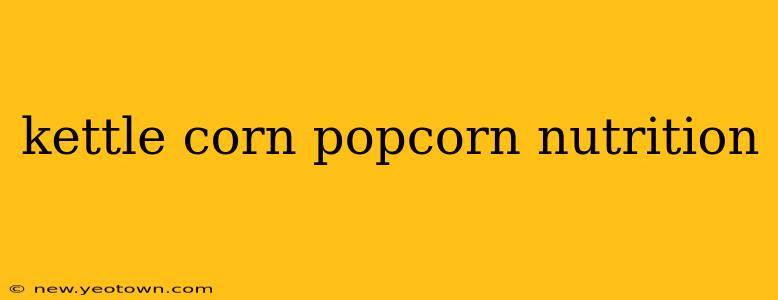Kettle corn, with its sweet and salty dance across your taste buds, is a beloved snack enjoyed by many. But amidst the deliciousness, lurks a question: is kettle corn actually good for you? Let's delve into the nutritional profile of this popular treat and uncover the truth behind its nutritional value. This isn't just about calories; we'll explore the benefits and drawbacks, helping you make informed choices about this crunchy delight.
What are the Nutritional Benefits of Kettle Corn?
Before we dive into the specifics, let's remember that kettle corn's nutritional value heavily depends on its preparation. Homemade versions, using minimal oil and sugar, offer a much healthier profile than commercially produced bags, often loaded with added butter, salt, and sugar.
That being said, even commercially-produced kettle corn boasts some nutritional positives, primarily stemming from its base ingredient: popcorn. Popcorn is a whole grain, providing fiber, which is crucial for digestive health. Fiber helps you feel full, aiding in weight management, and it also promotes healthy gut bacteria. A serving of kettle corn can also contribute to your daily intake of essential minerals like magnesium and zinc. These minerals play vital roles in bodily functions ranging from energy production to immune system support.
How Many Calories are in Kettle Corn?
This is where things can get tricky. The calorie count in kettle corn significantly varies depending on the serving size and preparation method. A typical serving (about 3 cups) of commercially prepared kettle corn can range from 300-400 calories. However, homemade kettle corn, especially when prepared with air-popping techniques and less added sugar, can significantly lower this number. Always check the nutrition label on pre-packaged products to accurately gauge the calorie count before indulging.
Is Kettle Corn Healthier Than Other Snack Foods?
Compared to many other processed snack foods, kettle corn can actually hold its own. While it's not a health food in the strictest sense, it often comes out on top when compared to chips, candy, or other heavily processed snacks. Its whole-grain base and potential for lower added sugar content give it a slight edge in terms of nutritional profile. However, moderation remains key. Consuming excessive amounts, regardless of the snack, can negate any potential health benefits.
Does Kettle Corn Contain Sugar?
Yes, kettle corn does contain sugar. The amount varies dramatically, though. Homemade recipes often use a minimal amount of sugar to complement the salty flavor of the popcorn. However, commercially prepared kettle corn often contains a significant amount of added sugar, contributing to its overall calorie and sugar content. If you're watching your sugar intake, checking the nutrition label and opting for lower-sugar options is vital.
Is Kettle Corn Gluten-Free?
Generally, plain popcorn is naturally gluten-free. However, it's crucial to ensure that the kettle corn you're consuming hasn't been processed in a facility that also handles gluten-containing products, or that it doesn't contain any added ingredients with gluten. Always check the ingredient list on the packaging to be certain. If making it at home, use certified gluten-free ingredients to be sure.
What are the Potential Downsides of Eating Kettle Corn?
While kettle corn can be part of a balanced diet, overconsumption can lead to several downsides. The high calorie and sugar content in many commercially prepared versions can contribute to weight gain. Excessive sodium intake can also be a concern, particularly for individuals with high blood pressure. Additionally, some commercially-produced kettle corn may contain artificial flavors, colors, and preservatives, which some people may want to avoid.
Conclusion: Enjoy in Moderation
Kettle corn can be a satisfying and occasionally enjoyable snack. Its nutritional value depends greatly on the preparation method and ingredients used. Opting for homemade versions with minimal added sugar and salt will enhance its nutritional profile. Ultimately, the key is moderation. Enjoying kettle corn as an occasional treat, rather than a daily staple, will allow you to savor its unique flavor without compromising your health goals. Remember to always check nutrition labels and make informed choices based on your individual dietary needs.

